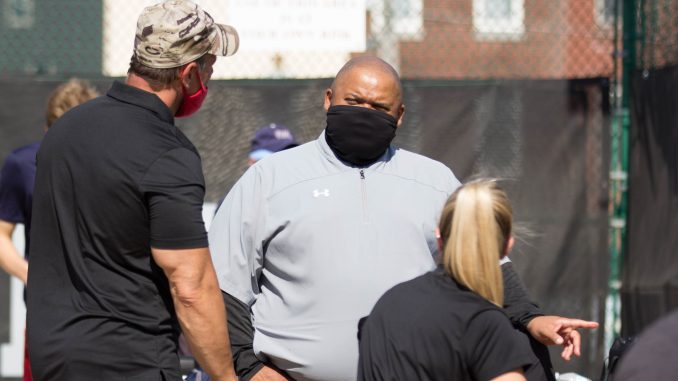
Daily health check-ins at night and a nose swab in the morning was a routine Temple University student-athletes became familiar with last year.
With the university’s new vaccine mandate requiring all students, faculty and staff to be fully vaccinated by Oct. 15, student-athletes who are unvaccinated will have to adjust to a new routine. Temple Athletics must follow any policies from the university, which means all student-athletes and coaches are obligated to receive vaccines unless a medical or religious exemption form is filled out.
Student-athletes and staff are about 80 to 85 percent fully vaccinated, according to Kevin Addison, the associate director of athletic training.
While Temple’s athletic trainers continue to educate student-athletes and staff on the benefits of receiving the vaccine, those who remain unvaccinated must abide by the NCAA, The American Athletic Conference and the City of Philadelphia’s COVID-19 procedures.
VACCINES
Vaccinated athletes will only receive a COVID-19 test if they are symptomatic. Those who are unvaccinated will take a weekly polymerase chain reaction test or an antigen test three times per week, if community spread is substantial or high. During the week of a competition, athletes will receive a PCR test within three days before the game or an antigen test within 24 hours of competition, according to the NCAA.
Student-athletes, who are unvaccinated, must receive a COVID-19 test three times a week in accordance with Philadelphia’s guidance, said Executive Senior Associate Athletic Director Jessica Reo.
The athletic trainers handled testing, health monitoring and positive cases for all student-athletes last season, but this year, students-athletes will receive COVID-19 tests through Temple’s testing program. With vaccination rates rising in Philadelphia, only those who are unvaccinated are required to be tested through one of Temple’s on-campus testing sites, Addison said.
“With the number of student-athletes that we have that are vaccinated, and the staff that we have that are vaccinated right now, we’ve been able to redirect some of that tracking and stress into care for our student-athletes,” Reo said.
Those who are unvaccinated may not be able to fly with their teammates depending on travel guidelines, said Senior Associate Athletic Director Lee Roberts
“Our kids all travel together on an airplane and then on the bus,” Roberts said. “You know who you’re traveling with, but they’ll have to go back to wearing the mask as needed.”
Temple Athletics remained flexible last season, and although some restrictions have been loosened, athletes risk losing access to the university’s buildings, suspension or expulsion if they are not vaccinated by Oct. 15 and do not abide by Temple’s testing procedures, according to a university announcement.
“Anyone who is not vaccinated will be required to be tested, whether they have a medical or religious exemption,” Reo said.
MASKING
A mask mandate will apply to unvaccinated and vaccinated athletes when indoors and in enclosed public spaces, like the weight room and training room.
Sports like volleyball, which is considered a high-risk sport by the NCAA, will require masks to be worn inside, except when student-athletes are practicing or competing. Fans who wish to come to a game are required to wear a mask, Roberts said.
“We will probably encourage people to spread out rather than sitting in a cluster,” he added. “We have the capacity for more than 3,000, so people are more than welcome to spread out.”
Outdoor sports, like field hockey and soccer, will not require fans to wear masks in the stands, but since proof of vaccination isn’t required to attend games, those protocols could change, Roberts said.
Temple football will follow the The Philadelphia Eagles’ protocols during home games, which require fans and stadium staff attending Lincoln Financial Field to wear masks in indoor spaces regardless of vaccination status.
“We are just trying to limit how much contact you have with people because you don’t go around asking everyone ‘are you vaccinated?’” Roberts said. “What we try to do is create some distance, which allows the student-athletes to play their event and also for fans, friends, family to still be able to enjoy the event.”
POSITIVE CASES
The NCAA and AAC will stick to the same quarantine procedures from last year for unvaccinated athletes. If a student-athlete or staff member tests positive for COVID-19, they will go into quarantine for 10 days after their first positive test, The Temple News reported.
If a vaccinated athlete comes in contact with a positive person they’ll continue practicing and receive testing three to five days after that exposure, Reo said.
The goal is for student-athletes to take the initiative and communicate with their coaches if they aren’t feeling well, Reo said.
EDUCATING
Addison and the trainers met with each of Temple’s Olympic and non-Olympic teams at the end of the spring season and provided them with background information on the vaccines available, Addison said.
In early August, Addison reminded staff and student-athletes to practice hygiene, social distancing and to avoid activities that could put the team in a compromised situation, like having to forfeit a game due to COVID-19 issues in the program, he added.
“We’ve been going through with our trainers and our coaches, we’re trying to get as many youngsters vaccinated as possible,” Roberts said. “How it affects us later on down the road, of course, will be the university mandate.”


Be the first to comment